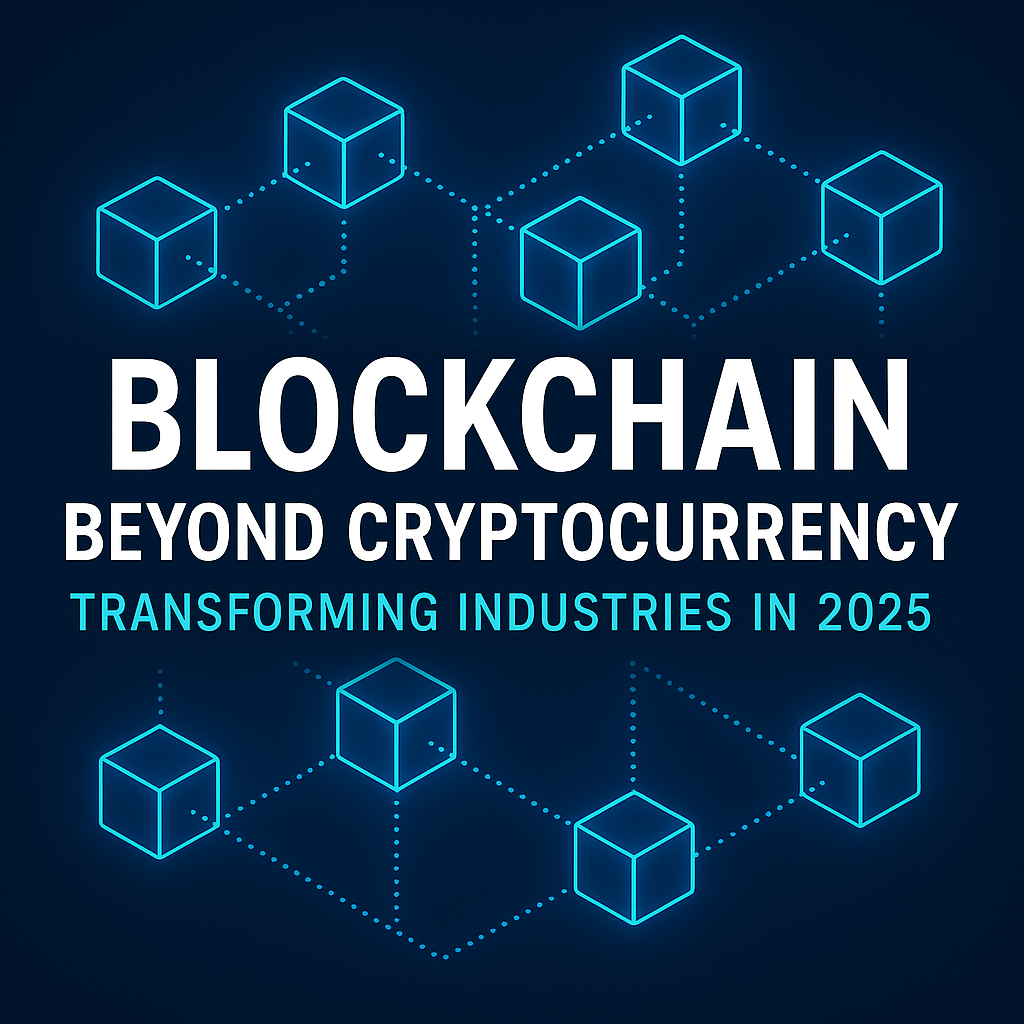Blockchain Beyond Cryptocurrency is no longer a futuristic concept—Blockchain Beyond Cryptocurrency is now a reality driving innovation across multiple sectors. In 2025, we’re witnessing a transformative shift, where Blockchain Beyond Cryptocurrency becomes a foundational technology in industries far beyond just financial transactions and digital coins. From supply chains to healthcare, education to governance, blockchain is revolutionizing how data is stored, shared, and secured.
In this article, we’ll explore how blockchain technology is being used outside of the cryptocurrency world, with real-life examples and insights into the future potential of this game-changing innovation.
📌 What Is Blockchain?
To truly understand the impact of blockchain beyond cryptocurrency, let’s first revisit what blockchain is. At its core, blockchain is a decentralized digital ledger that records transactions in a secure, transparent, and immutable manner. Each “block” contains a list of records, and every new block is linked to the previous one—hence the name “blockchain.”
What makes blockchain special is its decentralized structure. It doesn’t rely on a central authority, meaning the data is stored across multiple computers (or nodes), making it highly secure and transparent.
🚀 The Evolution of Blockchain Technology
Originally designed to support Bitcoin, blockchain’s first use case was digital currency. But over the past decade, developers, startups, and enterprises have realized the potential of using blockchain for more than cryptocurrency. Smart contracts, decentralized apps (dApps), and permissioned blockchain systems are now being applied across a wide range of industries.
In 2025, this evolution has taken another leap forward. Enterprises are adopting blockchain for data integrity, traceability, automation, and cost-saving efficiencies.
🏥 1. Blockchain Beyond Cryptocurrency in Healthcare
The healthcare sector is one of the top industries being transformed by blockchain beyond cryptocurrency. Patient records, once siloed across different institutions, are now becoming more unified and secure through blockchain-powered solutions.
Key Benefits:
- Data Privacy & Security: Patient data is encrypted and can only be accessed through permissions.
- Interoperability: Medical records can shared seamlessly between hospitals and doctors.
- Drug Traceability: Blockchain helps track pharmaceuticals from manufacturer to consumer, reducing counterfeit drugs.
Real Example:
Companies like MediLedger and BurstIQ are already using blockchain to securely manage patient data and pharmaceutical supply chains.
🚚 2. Supply Chain Management Revolution
One of the strongest use cases of blockchain beyond cryptocurrency is in supply chain transparency. In traditional systems, tracking goods through every stage of the supply chain is inefficient and prone to errors or fraud.
How Blockchain Helps:
- Transparency: Every transaction and transfer is recorded immutably.
- Real-time Tracking: Companies can track products from origin to destination.
- Trust Building: All parties involved can verify the authenticity of goods.
Real Example:
Walmart uses blockchain technology to trace the origin of food products, reducing the time needed to track foodborne illnesses from weeks to seconds.
📑 3. Blockchain Beyond Cryptocurrency and Digital Identity
Imagine a world where you control your digital identity without needing to rely on a third party. That’s the promise of blockchain-based identity systems.
Key Advantages:
- Self-Sovereign Identity: Individuals have complete control over their personal data.
- Secure Authentication: Reduces risks of identity theft and fraud.
- Portability: One blockchain ID can used across multiple platforms.
Real Example:
Civic and uPort are platforms offering blockchain-based identity verification solutions already being piloted in various countries.
🗳️ 4. Blockchain Beyond Cryptocurrency in Voting Systems
Blockchain is also reshaping how we vote, adding transparency and trust in election systems.
Why Blockchain Voting Matters:
- Tamper-Proof Records: Every vote is securely recorded on the blockchain.
- Transparency: Anyone can verify the results.
- Remote Voting: Citizens can vote securely from anywhere.
Real Example:
Estonia has experimented with blockchain-based e-voting, and several U.S. states are exploring the technology for future elections.
🎓 5. Education and Academic Records
Blockchain technology is improving the way educational institutions issue and verify academic records.
Benefits:
- Instant Credential Verification: No need for manual checks.
- Tamper-Proof Diplomas: Records can’t altered or faked.
- Lifelong Learning Records: Students can carry their verified academic history wherever they go.
Real Example:
MIT and the University of Nicosia are issuing diplomas via blockchain, ensuring authenticity and easy verification for employers.
💼 6. Blockchain Beyond Cryptocurrency in Human Resources and Recruitment
Recruitment fraud is a serious issue. Blockchain is helping HR professionals ensure that resumes and experience claims are accurate.
Features:
- Verified Work History: Employment data can stored on-chain.
- Skill Validation: Certifications and degrees can instantly confirmed.
- Faster Onboarding: Background checks and reference verifications streamlined.
🎨 7. Creative Industries and Intellectual Property Protection
In 2025, artists, musicians, and writers are turning to blockchain to protect their intellectual property and receive fair compensation.
Advantages:
- Proven Ownership: Creators can register their work on-chain.
- Royalty Tracking: Payments can automated through smart contracts.
- NFTs: Non-Fungible Tokens are still in use, especially for digital art.
Real Example:
Platforms like Audius and Async Art use blockchain to empower artists with control and fair revenue sharing.
🏦 8. Blockchain Beyond Cryptocurrency in Banking & Finance (Beyond Coins)
Even within finance, blockchain is going beyond cryptocurrency. Banks are now using blockchain for internal processes like settlements, compliance, and fraud detection.
Use Cases Blockchain Beyond Cryptocurrency:
- Faster Settlements: Cross-border payments are faster and cheaper.
- Smart Contracts: Automate tasks like insurance claims or loan approvals.
- Audit Trails: Reduce fraud and enhance compliance.
Real Example:
JPMorgan’s Onyx platform uses blockchain to settle billions of dollars in daily transactions.
🏛️ 9. Blockchain Beyond Cryptocurrency in Government and Public Services
Blockchain is enhancing the transparency and efficiency of public sector operations.
Use Cases : Blockchain Beyond Cryptocurrency
- Land Registries: Securely record land ownership and property rights.
- Public Records: Transparent and unchangeable citizen records.
- Social Welfare: Efficient distribution and tracking of government aid.
Real Example:
Dubai aims to become the world’s first blockchain-powered government.
🧠 10. The Role of Smart Contracts through Blockchain Beyond Cryptocurrency
Smart contracts are self-executing pieces of code stored on the blockchain. They automatically perform actions once predefined conditions met.
Why They Matter:
- No Intermediaries Needed: Cuts costs and saves time.
- Trustless Transactions: Reduces disputes and ensures compliance.
- Automation: Everything from insurance claims to rental agreements can managed automatically.
🔮 The Future of Blockchain Beyond Cryptocurrency
As more industries adopt this decentralized technology, the world is heading toward a more transparent, efficient, and secure digital future. The focus will shift from blockchain as a buzzword to blockchain as a backbone of innovation.
Here are some future trends to watch:
- Interoperability Between Blockchains: Connecting different blockchain networks.
- Zero-Knowledge Proofs: Enhanced privacy in transactions.
- Green Blockchain: Energy-efficient consensus mechanisms like Proof of Stake (PoS).
🧾 Conclusion on Blockchain Beyond Cryptocurrency
Blockchain Beyond Cryptocurrency is no longer a trend—it’s a revolution. From improving healthcare systems to transforming supply chains, from secure digital identities to fairer creative industries, blockchain is setting new standards for how we interact with data and technology.
As 2025 unfolds, it’s clear that the real power of blockchain lies in its ability to go beyond digital currencies and provide real-world solutions that matter.
Whether you’re a business leader, a developer, or just curious about the future, now is the time to understand and embrace the transformative potential of blockchain beyond cryptocurrency.
✍️ About the Author & This Blog
This in-depth exploration of Blockchain Beyond Cryptocurrency was brought to you by Muhammad Ahmad, the founder of ptipakistan.com. Passionate about emerging technologies and digital transformation, Ahmad shares insightful articles on blockchain, AI, tech trends, and global innovation.
Visit ptipakistan.com for more blog posts, news, and analysis on how technology is shaping our future—beyond borders, beyond limits.



